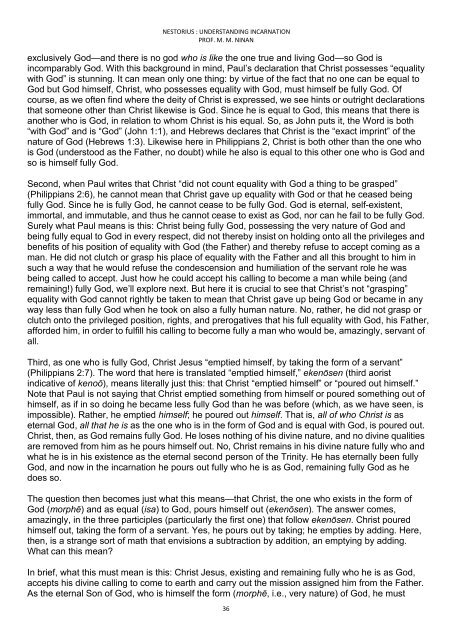Nestorius
Create successful ePaper yourself
Turn your PDF publications into a flip-book with our unique Google optimized e-Paper software.
NESTORIUS : UNDERSTANDING INCARNATION<br />
PROF. M. M. NINAN<br />
exclusively God—and there is no god who is like the one true and living God—so God is<br />
incomparably God. With this background in mind, Paul’s declaration that Christ possesses “equality<br />
with God” is stunning. It can mean only one thing: by virtue of the fact that no one can be equal to<br />
God but God himself, Christ, who possesses equality with God, must himself be fully God. Of<br />
course, as we often find where the deity of Christ is expressed, we see hints or outright declarations<br />
that someone other than Christ likewise is God. Since he is equal to God, this means that there is<br />
another who is God, in relation to whom Christ is his equal. So, as John puts it, the Word is both<br />
“with God” and is “God” (John 1:1), and Hebrews declares that Christ is the “exact imprint” of the<br />
nature of God (Hebrews 1:3). Likewise here in Philippians 2, Christ is both other than the one who<br />
is God (understood as the Father, no doubt) while he also is equal to this other one who is God and<br />
so is himself fully God.<br />
Second, when Paul writes that Christ “did not count equality with God a thing to be grasped”<br />
(Philippians 2:6), he cannot mean that Christ gave up equality with God or that he ceased being<br />
fully God. Since he is fully God, he cannot cease to be fully God. God is eternal, self-existent,<br />
immortal, and immutable, and thus he cannot cease to exist as God, nor can he fail to be fully God.<br />
Surely what Paul means is this: Christ being fully God, possessing the very nature of God and<br />
being fully equal to God in every respect, did not thereby insist on holding onto all the privileges and<br />
benefits of his position of equality with God (the Father) and thereby refuse to accept coming as a<br />
man. He did not clutch or grasp his place of equality with the Father and all this brought to him in<br />
such a way that he would refuse the condescension and humiliation of the servant role he was<br />
being called to accept. Just how he could accept his calling to become a man while being (and<br />
remaining!) fully God, we’ll explore next. But here it is crucial to see that Christ’s not “grasping”<br />
equality with God cannot rightly be taken to mean that Christ gave up being God or became in any<br />
way less than fully God when he took on also a fully human nature. No, rather, he did not grasp or<br />
clutch onto the privileged position, rights, and prerogatives that his full equality with God, his Father,<br />
afforded him, in order to fulfill his calling to become fully a man who would be, amazingly, servant of<br />
all.<br />
Third, as one who is fully God, Christ Jesus “emptied himself, by taking the form of a servant”<br />
(Philippians 2:7). The word that here is translated “emptied himself,” ekenōsen (third aorist<br />
indicative of kenoō), means literally just this: that Christ “emptied himself” or “poured out himself.”<br />
Note that Paul is not saying that Christ emptied something from himself or poured something out of<br />
himself, as if in so doing he became less fully God than he was before (which, as we have seen, is<br />
impossible). Rather, he emptied himself; he poured out himself. That is, all of who Christ is as<br />
eternal God, all that he is as the one who is in the form of God and is equal with God, is poured out.<br />
Christ, then, as God remains fully God. He loses nothing of his divine nature, and no divine qualities<br />
are removed from him as he pours himself out. No, Christ remains in his divine nature fully who and<br />
what he is in his existence as the eternal second person of the Trinity. He has eternally been fully<br />
God, and now in the incarnation he pours out fully who he is as God, remaining fully God as he<br />
does so.<br />
The question then becomes just what this means—that Christ, the one who exists in the form of<br />
God (morphē) and as equal (isa) to God, pours himself out (ekenōsen). The answer comes,<br />
amazingly, in the three participles (particularly the first one) that follow ekenōsen. Christ poured<br />
himself out, taking the form of a servant. Yes, he pours out by taking; he empties by adding. Here,<br />
then, is a strange sort of math that envisions a subtraction by addition, an emptying by adding.<br />
What can this mean?<br />
In brief, what this must mean is this: Christ Jesus, existing and remaining fully who he is as God,<br />
accepts his divine calling to come to earth and carry out the mission assigned him from the Father.<br />
As the eternal Son of God, who is himself the form (morphē, i.e., very nature) of God, he must<br />
36

















